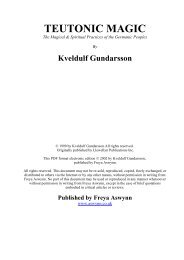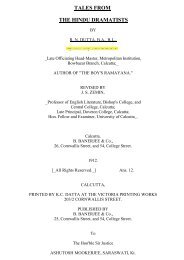Untitled - Awaken Video
Untitled - Awaken Video
Untitled - Awaken Video
You also want an ePaper? Increase the reach of your titles
YUMPU automatically turns print PDFs into web optimized ePapers that Google loves.
Chapter 5. The Underworld 138<br />
For the early Teutons, life was viewed in cycles, and birth and death were a<br />
part of one of the cycles. Another was the yearly cycle of the seasons. Agricultural<br />
peoples are more closely attuned to the yearly progression of the seasons than is<br />
modern man and this yearly cycle included, obviously, dealing with work as the<br />
weather permitted but, also, with the cycle of holidays and festivals celebrated both<br />
within the family unit (such as birthdays, rites of passage, etc.) and outside the<br />
family unit (such as community celebrations, funerals, festivals, markets, etc.).<br />
For the ancients, forces emanating up from the Underworld, the Land of the<br />
Ancestors, forced changes on Midgard, but with these changes also came the sense<br />
of continuity or “sameness.” Everything, for the ancient Germans, had a birth and<br />
a death whereupon the cycle was started anew. Change, for them, was acceptable<br />
because of their belief in the somewhat circular nature of time. For modern man,<br />
there is generally a sense of “pending doom” because in modern philosophical terms<br />
of the average man “time” is linear; therefore, the world as it is changing today<br />
is progressing towards a chaotic end. “Society is getting worse!” the papers say.<br />
“Pollution is out of control!” Thinking in terms of a linear flow of time is depressing<br />
and it is no wonder that modern folk have such a difficult time accepting change.<br />
This new generation, this Generation X, is seen by many as the-end-of-it-all. They<br />
are violent, apathetic, they do not attempt to live within the bonds of society as<br />
it exists; they question everything and offer no solutions. In one sense, however,<br />
a cyclical sense, they are nothing more than the newest cycle of the Baby Boomer<br />
generation of the 1960’s and curiously enough resemble in many ways the generations<br />
which produced the Viking Age! Everything changes but somehow there is a<br />
sameness running through it all.<br />
In the ancient mind, everything moved in cycles, but the force driving the cycles<br />
appears to have come from elsewhere. For the ancient Teutons, the force came from<br />
the Land of the Dead which is implied in the reciprocal relationship between the<br />
Underworld and Midgard sometimes used as illustration in Germanic folklore but<br />
more prominent in folklore bordering the Germanic realm. The idea of ancestor<br />
worship which is repugnant to some is not really necessary to participate in the<br />
Underworld tradition. All that is needed is the development of a sense of acceptance<br />
and respect for one’s own starting point and for the forces which created<br />
that starting point, i.e., the ancestors of one’s personal lineage. Grooming the<br />
links between the Underworld and Midgard need not be really any more elaborate<br />
than offering an attitude of thankfulness, which, for the ancient Germanic peoples,<br />
occurred communally during the primary festivals of the year: Winternights, Júl,<br />
and Summernights. One does not even have to entertain any particular spiritual<br />
belief system, or have any belief at all, for that matter, to demonstrate some sense<br />
of gratitude.
















